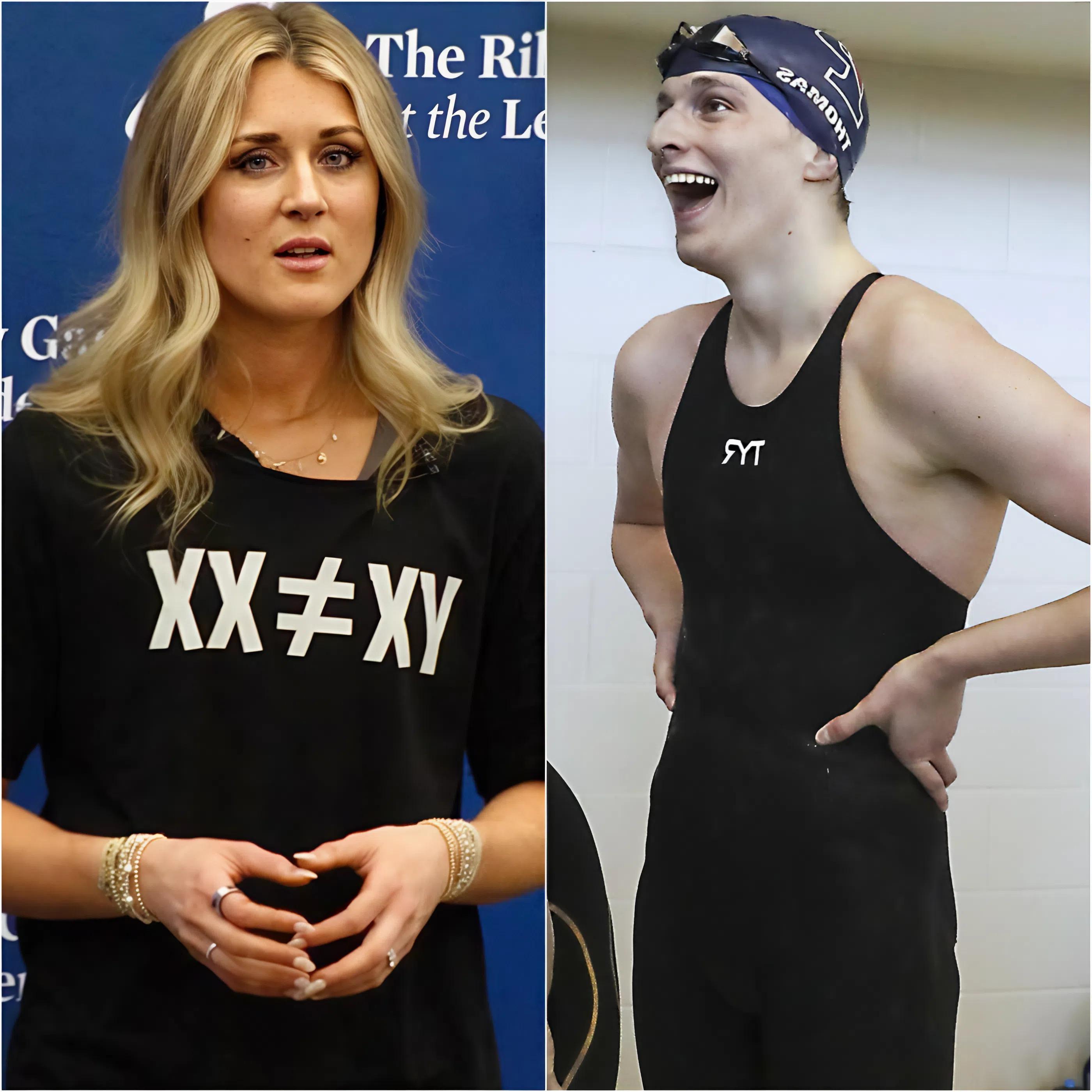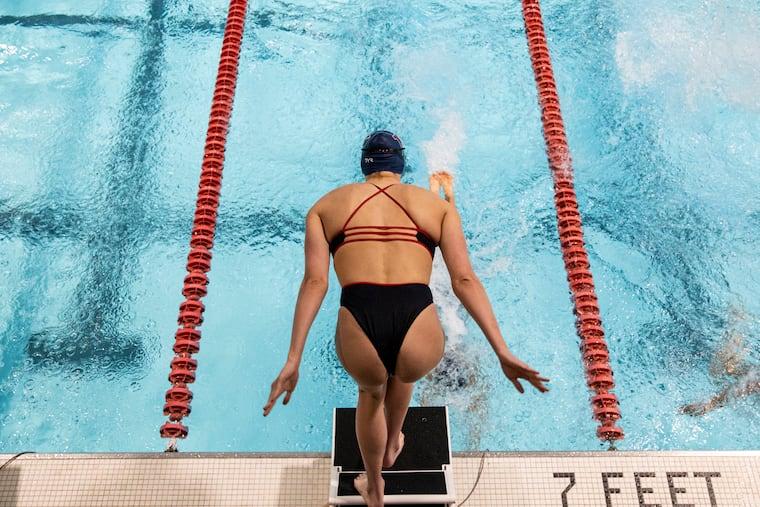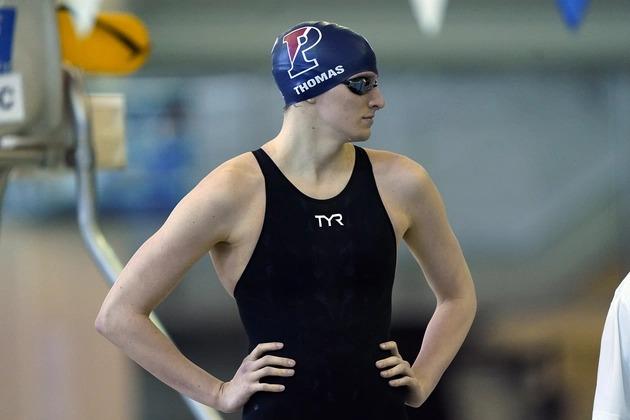🔥 SHOCKING SHOWDOWN IN WOMEN’S SPORTS! What was meant to be a night of celebration turned into one of the most talked-about controversies of the year. The Violet Visionary Awards became the stage for a fierce clash between two of the most polarizing names in swimming — Riley Gaines and Lia Thomas.

The tension began when Lia Thomas was announced as the recipient of the “Inspiration in Sports” award, an honor meant to celebrate resilience and influence. But not everyone in the room shared the applause — especially Riley Gaines, whose reaction spoke louder than words.
“An Inspiration Award? For someone who disrespects women and competes unfairly?” Riley was overheard saying to a fellow athlete. Her voice carried across the crowd, igniting an immediate stir. Cameras turned, whispers erupted, and the atmosphere shifted from celebration to confrontation.
Riley, a vocal advocate for fairness in women’s sports, stood visibly tense as Lia took the stage. The audience watched closely — the icy exchange of glances between the two swimmers was impossible to ignore. The moment Lia began to speak, Riley folded her arms and looked away.
When Lia accepted the award, she delivered what many perceived as a subtle jab: “It’s inspiring to see women breaking barriers — even when others try to build walls.” The room erupted into mixed applause and gasps. Riley’s expression hardened instantly.
Moments later, as cameras flashed, Lia turned in Riley’s direction and made a mocking salute — a gesture that quickly became viral across social media. The internet lit up within minutes, fans choosing sides in a digital storm that hasn’t stopped since.
Riley, furious, confronted reporters outside the venue. “We’re rewarding hypocrisy!” she declared. “We tell young girls to work hard, play fair — but tonight, we celebrated someone who did neither.” Her words exploded online, shared and debated millions of times.
Lia, however, didn’t back down. Hours later, she posted a photo of herself holding the trophy with a caption that read: “Winning — in every sense.” The post drew both admiration and outrage, solidifying her reputation as one of the sport’s most controversial figures.

As the online firestorm grew, sources revealed that the two athletes had been at odds for months. Riley had previously criticized the system that allowed Lia to compete in women’s events, calling it “a betrayal of biological reality.” Lia, in return, accused Riley of spreading “hate under the guise of fairness.”
At the awards, that cold rivalry finally boiled over. Witnesses said Riley attempted to leave mid-ceremony, only to stop when Lia publicly invited her “to race again anytime — if she’s brave enough.” The challenge sent shockwaves through the audience.
Reporters scrambled for quotes as tensions hit a boiling point. “That’s not bravery,” Riley snapped afterward. “That’s manipulation. She knows the system favors her — and now she’s using it for publicity.” Her frustration was raw, and for many, understandable.
The sports community reacted instantly. Some praised Riley for speaking out, calling her “the voice of fairness.” Others defended Lia, arguing she had every right to compete and be recognized. The debate reignited old wounds and divided fans across the globe.
Meanwhile, the Violet Visionary Awards committee released a statement defending their decision, citing Lia’s “courage and resilience in facing adversity.” But the backlash was already spiraling out of control — sponsors were questioned, and hashtags like #FairPlayNow and #StandWithRiley began trending worldwide.
Behind the scenes, insiders claimed Riley had received dozens of messages of support from fellow athletes who felt silenced by fear of backlash. “She said what we all think but are afraid to say,” one swimmer confessed anonymously.
Lia, meanwhile, appeared unfazed by the controversy. “People can say what they want,” she told reporters the next day. “I’m focused on progress — not pleasing everyone.” Her calm demeanor only fueled Riley’s anger, especially after Lia hinted at a potential exhibition race “to settle the debate once and for all.”
The idea of a head-to-head rematch between the two immediately went viral. Fans demanded it. Commentators debated it. “It would be the most-watched swim event in modern history,” one analyst said. “A rivalry that’s no longer just about sport — it’s about ideology.”
Riley, however, seemed reluctant. “This isn’t about beating her in a pool,” she said during a podcast interview. “It’s about truth, fairness, and respect. Until the system changes, no result in the water will matter.” Her conviction was unwavering.
Yet Lia’s confidence remained unshaken. In a cryptic post later that week, she wrote: “You can’t drown someone who knows how to swim through hate.” The quote instantly made headlines — hailed by supporters, condemned by critics.
By the weekend, public opinion was completely polarized. Protesters gathered outside the WTA’s sister sports summit, holding banners both supporting and opposing Lia’s award. The clash between ideology and fairness had escaped the pool — it had become a cultural storm.

Sports ethicists weighed in, calling the feud “a defining moment for women’s athletics.” One commentator stated, “This isn’t just about two athletes. It’s about how we define fairness, inclusion, and the very essence of competition in the 21st century.”
Through it all, Riley Gaines stood her ground. “This isn’t hate,” she clarified in her final statement. “This is about protecting women’s sports — not destroying them.” Her words echoed through social media, shared by countless athletes and parents alike.
As for Lia Thomas, she continued training, appearing unbothered. “Let the pool decide,” she told a reporter, smiling confidently. “Water doesn’t lie.” The challenge remained — open, daring, and ready to ignite the next chapter of one of the most explosive rivalries in modern sports.
By night’s end, the Violet Visionary Awards had become more than an event — it was a battlefield of beliefs. Riley and Lia may share the same sport, but their visions of fairness will forever divide the crowd. And for the world watching, the question still burns:
In a fight between equality and integrity — who really wins? 💥